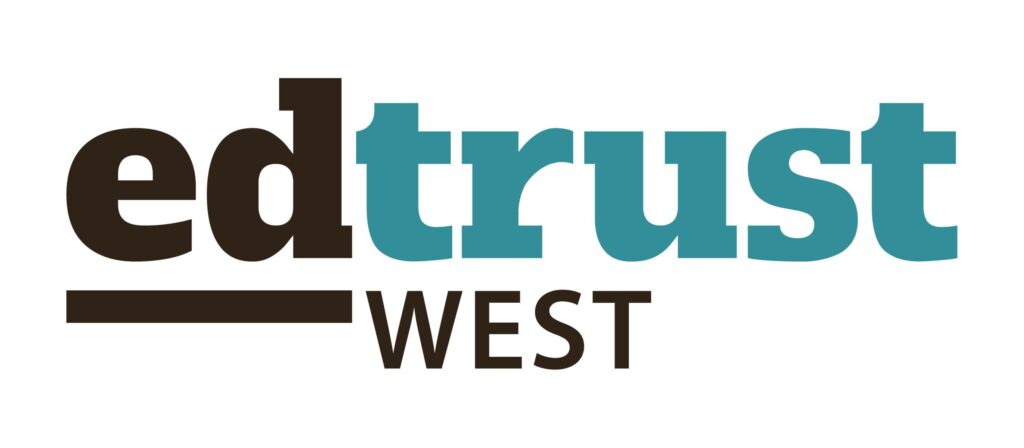On behalf of The EdTrust-West, Ryan J. Smith issued the following statement on the Governor’s May Revision for the proposed 2018-19 California state budget:
K-12 Education
“We appreciate Governor Brown’s commitment to keeping the Local Control Funding Formula on track with the state’s initial target funding levels. We also appreciate that the Governor responded to stakeholder feedback and offers improvements to his LCFF fiscal transparency proposal, and we hope that the final details of these proposals truly embrace equity. Parents and community members need a clear, accessible way to see how the funds generated by our low-income, English learner, and foster youth students are being used to increase or improve services for those students.
The Governor’s May Revision has a number of proposals, including the fiscal transparency, school climate, and community engagement efforts, which have the potential to significantly increase the capacity of parents, students, and other community members to participate in the LCFF process and improve district-stakeholder relationships. As these proposals are worked out, we urge the Governor and Legislature to keep their focus on the millions of students in our schools, and their families, who fought for LCFF and whose engagement is crucial to realizing true local control.
Higher Education
We are happy to see that Governor Brown continues to highlight the urgent need to restructure the California Community Colleges funding and we support a funding formula that prioritizes student success and equity. We appreciate that the Governor adjusted his proposal in ways that clearly respond to stakeholder feedback: providing additional base funding for more marginalized student groups, focusing specific attention on the success of low-income students, and incentivizing colleges to use data to assess and demonstrate whether students are progressing on their pathway toward completion.
More than 2 million students – the majority of whom are students of color – attend these colleges, and currently more than half of degree-seeking students do not complete a certificate, degree, or transfer within 6 years. These outcomes are even worse for low-income students, who stand to benefit should colleges rethink programs and services with an eye to better serving students and closing equity gaps. Too often we hear only about what these students need to do differently rather than how our systems can and should operate differently when given the right resources. The students currently enrolled at our 114 community college campuses will play a key role in our state’s continued prosperity. We urge California leaders to live up to our state’s progressive values and provide the resources and institutional support necessary to prioritize equity in our community colleges.”
The State Budget Process
Each year the Governor and the Legislature develop the state’s budget. Policymakers’ decisions during this process have a ripple effect across every aspect of state government, including California’s early, K-12, and higher education systems.
- In January of each year, the Governor proposes a state budget for the following fiscal year that begins on July 1st.
- In the spring, the Legislature holds hearings on parts of the proposed budget.
- In May, the Governor revises the proposed budget according to updated state revenues received in April. The revised budget is called the May Revision or “May Revise”.
- The Legislature may add to, or change, the Governor’s proposals and differences between proposals are negotiated as the final budget takes shape in the Legislature. The Legislature also develops and passes “trailer bills,” which direct the budget’s implementation. The Legislature must adopt the final budget by June 15th.
- Finally, the Governor signs the budget, and has the discretion to reduce or eliminate any expenditure by line-item veto.
Governor’s Proposed May Revision (2018-19) Budget At A Glance
K-12 Education
- LCFF: The May Revision proposes an additional $320 million to the $3 billion proposed in January to fully implement the formula.
- Community Engagement Initiative: The May Revision proposes $13.3 million in one-time funds to create the Community Engagement Initiative. The program would utilize the statewide system of support to build the capacity of school districts to engage with local communities, specifically in the development of Local Control and Accountability Plans and improving student outcomes.
- Fiscal Transparency: The May Revision proposes to expand the Governor’s January proposal for a budget summary aligning school district expenditures to LCAP strategies to specify that it be parent friendly, include specific information on how supplemental grants are used to increase or improve services for high-need students, and include graphical representation of information, when possible.
- School Climate: The May Revision proposes $15 million in one-time funds to expand the state’s Multi-Tiered Systems of Support framework to foster positive school climate in academic and behavioral areas.
- System of Support: The May Revision proposes an increase of $5 million in funding for the California Collaborative for Educational Excellence, in addition to funding proposed in the January budget for the system of support. In January, the budget proposed an increase of $59.2 million for county offices of education to provide technical assistance to local educational agencies and improve student outcomes. The Governor also proposed $11.3 million to fund the California Collaborative for Educational Excellence. Total funding proposed to be provided for supports to local educational agencies is approximately $75 million.
- One-Time Discretionary Funding: The May Revision proposes an additional $286 million to the $1.8 billion in one-time funds to school districts, charter schools, and county offices of education to be used at local discretion. All of the funds provided will offset any applicable mandate reimbursement claims for these entities.
- Special Education Teachers: The May Revision maintains the investment proposed in the January budget of $100 million to increase and retain special education teachers through a teacher residency grant program and a grant program to support locally identified solutions.
Higher Education
- CCC Student-Focused Formula: The May Revision adds $104 million in one-time funds for hold harmless provisions to the investment of $175 million proposed in the January budget to support community college districts’ transition to a student-focused funding formula.
- California College Promise (AB 19): The May Revision maintains the investment of $46 million proposed in the January budget to support the implementation of the California College Promise (AB 19).
- Online Community College: The May Revision maintains the investment of $120 million ($20 million ongoing) proposed in the January budget to establish a fully online community college.
- Cal Grant Awards for Private Non-Profit / For-Profit Institutions: The May Revision maintains the commitment to keep the maximum Cal Grant award at $9,084 for students attending private, non-profit institutions accredited by the Western Association of Schools and Colleges, and adjusts the accompanying transfer admission target. The January budget proposed an increase in transfer admissions of 2,500 students. The May Revision proposes to phase-in the increase from 2,000 students to 3,500 students over three years.
- UC and CSU Proposed Fee Increases: Both the UC and the CSU postponed decisions on fee increases to assess the level of funding provided in the May Revision. The May Revision would provide no additional funding, and adds provisions to the Budget Act authorizing the Director of the Department of Finance to reduce general appropriations to both systems if fees are increased. The amount of the reduction would be equal to the amount provided to students in financial aid to cover the increase in fees.
- Anti-bias Training: The May Revision provides $1.2 million in one-time funds to UC and CSU to administer a pilot program in anti-bias training for faculty, students and staff.


